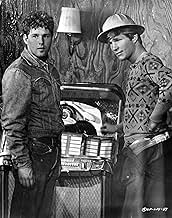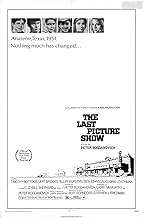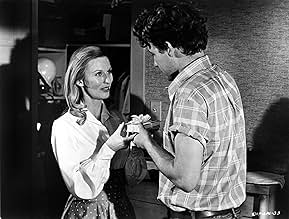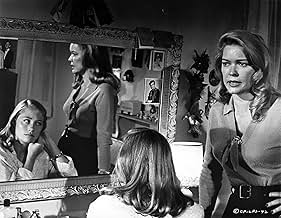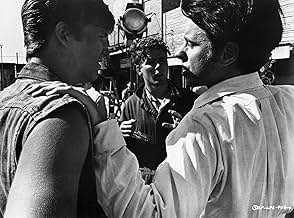En 1951, un groupe de lycéens grandissent dans une ville isolée et perdue du Texas qui meurt lentement, à la fois culturellement et économiquement.En 1951, un groupe de lycéens grandissent dans une ville isolée et perdue du Texas qui meurt lentement, à la fois culturellement et économiquement.En 1951, un groupe de lycéens grandissent dans une ville isolée et perdue du Texas qui meurt lentement, à la fois culturellement et économiquement.
- Réalisation
- Scénario
- Casting principal
- Récompensé par 2 Oscars
- 19 victoires et 22 nominations au total
- Charlene Duggs
- (as Sharon Taggart)
Avis à la une
Bogdanovich's love affair with film is undeniable, though it has, in the past three decades, yielded far more perplexing misfires (The Cat's Meow, At Long Last Love, Nickelodeon) than unqualified successes. That said, The Last Picture Show is an extraordinary accomplishment and worthy of its place in the list of great films of the 1970s.
1971's other important films (Friedkin's The French Connection, Pakula's Klute, Kubrick's Clockwork Orange) are loud, angry, violent and contemporary in-your-face reflections of a society in which rage and nihilism, engendered by Vietnam and the growing discontent over government corruption, is the currency of communication. The uncertainty coursing through the veins of American pop culture also begat in equal, if not equally graphic, measure a palpable sense of sorrow at the destruction of a simpler way of life (no matter how "true" that memory may be).
Like Jewison's Fiddler on the Roof and Altman's McCabe & Mrs. Miller, The Last Picture Show is a powerful and poignant evocation of the death of a community and a way of life. Thematically rich and imbued with Bogdanovich's remarkable knowledge and passion for film, the movie works on a dazzling number of levels; and Bogdanovich's use of nostalgia and traditional, archetypal genre conventions both enriches the movie and compounds the heartbreaking loss at the heart of the story.
His deft handling of a cast comprised of then (largely) unknowns (Bridges, Bottoms, Shepherd) is first-rate and he draws forth superb, often sublime performances from everyone (in particular, Johnson, Burstyn and Leachman). There isn't a false note or a misstep in the movie and there is a naturalness here that is not easily achieved or earned. The great production design (by Bogdanovich's then wife and partner Polly Platt whose contributions to his work and her subsequent involvement in the best works of James L. Brooks should not go underestimated) and the achingly beautiful cinematography by the late Robert Surtees are vital to the success (emotionally, intellectually, thematically) of the film.
The Last Picture Show is a truly rare work of surprising depth and emotional resonance; and the heartache for a time and place forever gone and the desperate and quiet struggles of its very real, very human denizens is matched only by the sorrow found in contemplation of Bogdanovich's Icarus-like fall from such exalted heights.
The story centers around two best friends, Sonny (Timothy Bottoms) and Duane (Jeff Bridges), as they pass from being high school seniors into adult life. Given their backgrounds, coming from broken homes and living in boarding houses, there is little idea that they will go to college. The movie details how the two handle this pivotal and bewildering time from being on the high school football team one year to being on their own without much of a safety net the next. In a wider context the movie is about larger transitions: from youth to adulthood for the young people, from a frustrated and bored middle age to an even less promising future for the older folks, and from a town with some social cohesiveness to a town dealing with the isolating effects of a bankrupt economy and the advent of television. The rather bleak prospects that Sonny and Duane face parallel the prospects of the town. You are made to think about transitions in your own life.
The movie is populated with many finely drawn characters, all acted with supreme skill. There is not a false note struck in the entire movie. By the end we know the characters so well that they seem real. Jeff Bridges was nominated for an Oscar, and I don't understand why Timothy Bottoms was not nominated as well, since his performance is of equal quality. Bottoms plays Sonny with such genuine good-natured charm and honest sincerity that it is hard to believe he is acting. And Ben Johnson and Cloris Leachman both won well-deserved Oscars. Kudos all round to the entire cast.
The movie is beautifully filmed in black and white befitting the stark settings and story, and the time period. It is filmed as if it were made in the period portrayed.
If you have ever lived in a small town or if you grew up in the American heartland in the 1950s, this movie will evoke overwhelming nostalgia. But the story is so powerfully told that I think that for everyone it will evoke nostalgia for a time and place, even for that which they may never have known.
The town, as well as the movie, is held together by Sam the Lion (Ben Johnson) who owns the movie theater, the café, and the pool hall. In fact he owns just about everything there is to do in Anarene, except for watching the hapless Anarene High football team ... and sex. It is no wonder then that sex, in its many faceted varieties, plays a big role in this town, and in this movie.
There are so many wonderful and memorable scenes that it would simply require a small volume to recount them. One scene that grabbed me was when Sam and Sonny are at a lake outside of town, ostensibly fishing, and Sam reminiscences about old times, about when he came to the lake twenty years earlier with a lover. Sam makes the comment, "You wouldn't believe how this land has changed." The camera pans the surroundings and it is hard to see how this area could have changed much in the last thousand years, but Sam is clearly attuned to the subtle changes, since memories were impressed on him in a time of strong emotion. We all have clear memories from when and where we have been happy, even if it is a small lake in a desolate flat land. And Sam's specific comment can be taken to apply more generally to the basic theme of the movie. This incredible scene ends with Sam's saying, "Being a decrepit old bag of bones, that's what's ridiculous," and anyone who is not close to tears at that point will never truly appreciate the beauty of this movie.
Seemingly this movie should be depressing, but the effect is more of a melancholic look into the lives of ordinary people who are just trying to play the hands they have been dealt in life.
It wasn't until the movie was over and I was reading the credits that I realized how cleverly the music had been woven into the film. All of the music is from the time period and is a part of the action and not background music. It is played on home radios, car radios, truck radios, 45 rpm players, jukeboxes, and at a community Christmas dance. The Hank Williams song, heard on the radio in Sonny's old truck in the opening scene, "Why Don't You Love Me Like You Used to Do?" sets the tone for the music as well as the movie. There are great songs taken from over a dozen country and western classics from the era. Ruth (Cloris Leachman) is listening to Johnny Standley's quirky, "It's in the Book," (a unique and strangely satirical offering to be popular at any time, let alone reach the pop charts and sell a million records in 1952) during the final scene between her and Sonny.
Why is this movie so special? That's kind of like asking why one likes a certain piece of music or a painting. Everything comes together here in one of those magic moments - the acting, the filming, the story, the music, the editing - to create a simply-told and remarkably affecting work of art.
Le saviez-vous
- AnecdotesCybill Shepherd was cast with the option of backing out of her nude scenes if she so desired. She only agreed to do them after asking the opinions of three female costars - Cloris Leachman, Ellen Burstyn, and Eileen Brennan, who all thought she should do them.
- GaffesThe lavalier mic on Duane's tie is visible during the graduation scene.
- Citations
Sam the Lion: You boys can get on out of here, I don't want to have no more to do with you. Scarin' a poor, unfortunate creature like Billy just so's you could have a few laughs - I've been around that trashy behavior all my life, I'm gettin' tired of puttin' up with it. Now you can stay out of this pool hall, out of my cafe, and my picture show too - I don't want no more of your business.
- Versions alternativesSpecial edition includes seven minutes of footage not included in the original release.
- ConnexionsFeatured in The Last Picture Show Re-Release Promo (1971)
- Bandes originalesCold, Cold Heart
(uncredited)
Written by Hank Williams (as Hank Williams Sr.)
Performed by Tony Bennett
Meilleurs choix
Détails
- Date de sortie
- Pays d’origine
- Langue
- Aussi connu sous le nom de
- La Última Película
- Lieux de tournage
- 605 South Ash Street, Archer City, Texas, États-Unis(high school)
- Sociétés de production
- Voir plus de crédits d'entreprise sur IMDbPro
Box-office
- Budget
- 1 300 000 $US (estimé)
- Montant brut aux États-Unis et au Canada
- 29 133 000 $US
- Montant brut mondial
- 29 146 746 $US
- Durée
- 1h 58min(118 min)
- Couleur
- Mixage
- Rapport de forme
- 1.85 : 1





